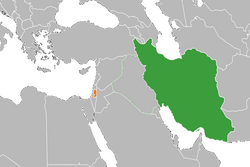Iran–Palestine relations
 | |
Iran |
Palestine |
|---|---|
| Diplomatic mission | |
| Embassy of Iran, Amman | Embassy of the State of Palestine, Tehran |
| Envoy | |
| TBD | Ambassador Salam al-Zawawi |
The Islamic Republic of Iran officially recognises Palestine as a state. Ali Khamenei, the Supreme Leader of Iran, rejects a two-state solution and implies that Palestine is inseparable, while Iran's former President Mahmoud Ahmadinejad called for a free referendum for the entire Palestinian population, including Arab citizens of Israel, to determine the type of government in the future Palestinian State,[1] while reiterating that establishment of a Palestinian State alongside Israel would "never mean an endorsement of the Israeli occupation".[2]
Prior to the 1979 Iranian Revolution, the Palestine Liberation Organization (PLO) held close ties with Iranian opposition groups. Following the revolution, Iran ended its alliance with Israel and started supporting the Palestinians, symbolized by turning over the Israeli embassy in Tehran to the Palestine Liberation Organization.[3]
In April 2022, Iranian state-run media Tasnim News Agency described Palestine by Ayatollah Khamenei as "An entire arena of resistance".[4]
Before the Iranian Revolution
Iran was the second majority Muslim nation after Turkey to grant (de facto) recognition of Israel, under the rule of Mohammad Reza Pahlavi, the last Shah of Iran.[5]
After the 1979 Iranian Revolution

The PLO backed the 1979 revolution, and several days after the revolution, PLO chief Yasser Arafat led a Palestinian delegation to Iran. The Palestinian delegates were publicly welcomed, and symbolically handed the keys to the former Israeli embassy in Tehran, which later became a Palestinian embassy.[6]
Relations during the Intifada
After the eruption of the second Palestinian intifada, in September 2000 after the collapse of Middle East peace talks at Camp David, Arafat released imprisoned Hamas and Islamic Jihad militants, a decision that restored the relations between Iran and the Palestinian National Authority. The renewed support became evident when Israeli commandos captured the Karine A in 2002, a ship carrying 50 tons of advanced weaponry from Iran to Gaza.[3]
Support for Hamas

Hamas is a military and political organization currently in power in the Gaza Strip. According to Mahmoud Abbas, President of the Palestinian National Authority, "Hamas is funded by Iran. It claims it is financed by donations, but the donations are nothing like what it receives from Iran.[7] Iran also supplies Hamas with military weaponry; technologies provided include Fajr-5, M-75, and M-302 rockets, as well as drones.[8]
Aid to Hamas increased after Arafat’s death in 2004 and Israel’s withdrawal from Gaza in 2005. Following the Hamas victory in the 2006 Palestinian elections, foreign aid dried up, leading Tehran to send significant financial aid to support the nearly bankrupt, Hamas led Palestinian National Authority.[3]
In July 2015, a senior Hamas official reported that the organization was no longer receiving aid from Iran, possibly due to Hamas's support for the rebels in the Syrian Civil War, as well as its improving relations with Saudi Arabia.[9]
Palestinian Authority officials' opinion
Palestinian Authority spokesman Nabil Abu Rudaineh has said of former Iranian President Mahmoud Ahmadinejad that "The one who does not represent the Iranian people, who falsified election results, who oppressed the Iranian people and stole authority has no right to speak about Palestine, its president or its representatives".[10]
In September 2010, former Iranian President Mahmoud Ahmadinejad said that the peace talks in Washington would not achieve their goals, because Hamas is the true representative of the Palestinian people, among other reasons. PA officials responded to these Iranian statements with "unprecedented ferocity". Omar Al-Ghoul replied that the time had come to put an end to Iran's "regime of death and destruction." Fatah spokesman Osama Al-Qawasmi said that Iran is striving to divide Palestine, to spark civil wars and sectarian and ethnic strife in numerous Arab regions, and therefore it cannot benefit the Palestinian people.[11]
See also
References
- ^ "Iran FM : Palestine not to be split into two pieces". Ministry of Foreign Affairs. 2 June 2012. Archived from the original on 19 August 2016. Retrieved 10 July 2016.
- ^ Iran Renews Call for Free Referendum in Palestine Archived 14 March 2012 at the Wayback Machine
- ^ a b c Rachel Brandenburg, Iran and the Palestinians, United States Institute of Peace
- ^ "Ayatollah Khamenei: Entire Palestine an Arena of Resistance - Politics news".
- ^ "From friends to foes: How Israel and Iran turned into arch-enemies". Haaretz.
- ^ "Iran and the Palestinians".
- ^ President Mahmoud Abbas: No To Violence, Terrorism, Gunfire, or Military Intifada. Palestine-pmc.com (28 December 2009). Retrieved on 2010-08-21.
- ^ "Iran: The Regional Power behind the Hamas War Effort". Jerusalem Center For Public Affairs. Retrieved 18 May 2016.
- ^ Levy, Elior (27 July 2015). "Senior Hamas official: No more military assistance from Iran". ynet. Retrieved 18 May 2016.
- ^ PA hits back at Ahmadinejad: You have no right to speak about Palestine
- ^ www.memri.org. "The Palestinian-Israeli Negotiations – A Current Overview". MEMRI - The Middle East Media Research Institute. Retrieved 18 May 2016.


